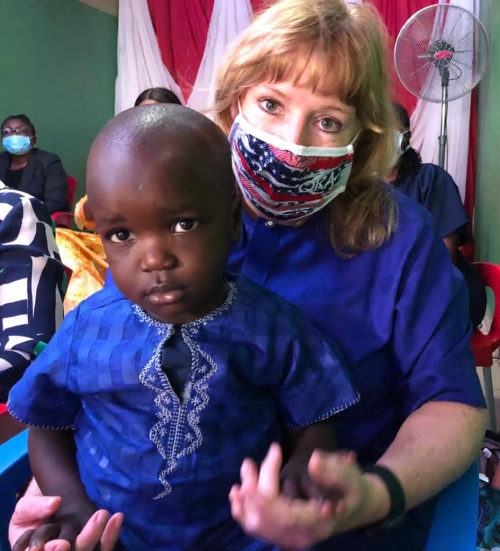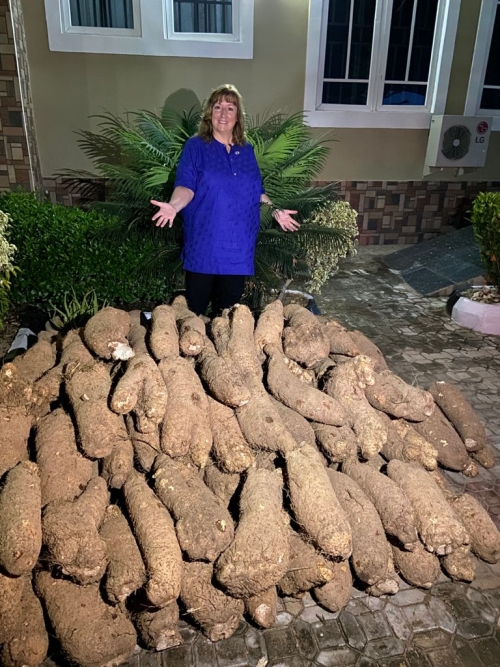
U.S. Ambassador champions health and human rights in Africa
Alum credits UC Davis mentorship with diplomatic successes

U.S. Ambassador Kathleen FitzGibbon, M.A. ’88, was sworn in to serve in the Republic of Niger just one day after the nation’s military had overthrown the government and detained its president.
The ambassador knew she was heading to a difficult post, but after working as a diplomat in West Africa for 20 years, FitzGibbon was optimistic about the challenges that lay ahead.
“There was a lot of work to be done, and I was eager to get started,” she said. Weeks later, in August 2023, she boarded a plane to Niger with her two rescue dogs and faithful companions, Mama and Destiny, by her side.
‘Part of something bigger’
FitzGibbon knew from a young age she wanted to be a diplomat, but it was an internship working on the 1980s Ethiopian famine that fueled her desire to forge a career in Africa.
For the past two decades, FitzGibbon has served as a senior foreign service officer in U.S. Embassies throughout Africa, including in Nigeria, Chad, Uganda, Sierra Leone and Gabon.
In addition to strengthening relations with foreign leaders and keeping an eye on violent extremist organizations, FitzGibbon has led efforts to negotiate the safe transport of Sudanese refugees from Darfur and quell the spread of infectious diseases such as HIV and Ebola. She has also worked extensively to reduce incidents of human trafficking and create opportunities for women and girls.
“These are real, tangible diplomatic efforts where you feel like you are part of something bigger than yourself,” she said. “I have been fortunate that in every post I’ve served in, there has been something important to contribute to.”
In 2020, FitzGibbon helped negotiate the military rescue of an American who had been kidnapped and taken to Nigeria. She also led the U.S. President’s Emergency Plan for AIDS Relief team in Nigeria, delivering lifesaving treatment to more than 1.5 million people with the HIV virus.
FitzGibbon has led efforts to negotiate the safe transport of Sudanese refugees from Darfur and quell the spread of infectious diseases such as HIV and Ebola. She has also worked extensively to reduce incidents of human trafficking and create opportunities for women and girls.
“We set the model for the whole continent,” she said.
FitzGibbon acknowledged that her career trajectory didn’t follow a straight path to get to where she is today. In fact, she’s taken steps in every direction and is better for it.
“Every experience you have is going to count toward a bigger future experience,” she said. “You may not reach your destination in a straight path, but just keep your eyes focused on where you want to go, and it will all work out.”
‘I hit the trifecta’ with UC Davis
When FitzGibbon chose to pursue a career in foreign policy, she sought out some of the best schools in California for graduate studies – Stanford, UC Berkeley and UC Davis. She visited all three, but a meeting with the late Donald Rothchild, who was a distinguished professor of political science, solidified her decision to become an Aggie.
“Rothchild focused on cross-cutting issues like conflict resolution or how political parties competed,” she explained. “He had a unique approach that put him at the cutting edge of his field.”
During his nearly 50-year career, Rothchild earned a reputation as one of the nation’s top foreign policy experts known for finding meaningful solutions to societal problems, with special emphasis on civil and ethnic conflicts in Africa.
Under his mentorship, FitzGibbon focused her graduate studies on international agricultural economics, which helped her understand the key role that agricultural systems play in influencing African politics.
FitzGibbon said she cherishes the memories she made at UC Davis.
“UC Davis is a part of my life that I look back at fondly because it was this idyllic college campus where people were friendly, healthy and open to new ideas,” she said. “It also had the best professors, and I loved how safe the town was. I hit the trifecta.”
She enjoyed attending college football and basketball games and working out at the campus gym. And she loved riding her bike everywhere, including a 10-mile daily trek to campus through the vineyards between Davis and Winters.
And FitzGibbon said she often crosses paths with UC Davis alumni who worked under Rothchild in the ’80s and ’90s.
We Aggies run into each other again and again in the foreign service,” she said. “Rothchild’s mentorship and comprehensive approach to finding solutions was so impactful for us.”
Finding balance, common ground are key to success

FitzGibbon stepped into her role as U.S. Ambassador to Niger amid much political instability, but she remains optimistic about the future. She is focused on finding common ground with the nation’s leaders and getting to a place where her team can safely return to the embassy. More than half of her team has been operating out of the U.S. since the military coup, a status she hopes will change soon.
“We are working to hit benchmarks so we can bring our whole family back,” she said.
As for now, FitzGibbon wears many hats in her daily job of running the U.S. Embassy, which includes many meetings, public-facing events and humanitarian work. No matter how busy things get, one thing she tries to reinforce to her team is the importance of self-care.
“When you’re in a crisis like this, people work their tails off and don’t always care for themselves,” she said, “so, a big part of my job is making sure people take time to find that balance.”
FitzGibbon has received many accolades for her years of dedicated public service, including a Presidential Rank Award, the James A. Baker Award for Outstanding Deputy Chief of Mission and the Hero of U.S. Diplomacy Award for leadership during the West Africa Ebola crisis from 2014 to 2016.
Her extensive experience in the foreign service includes her most recent role as the Deputy Chief of Mission of the U.S. Embassy in Nigeria. Prior to that, she served as Division Chief for West and Southern Africa and Director of the Office of Africa Analysis for the U.S. State Department.
“It’s been a very long road,” she said, “but it’s been worth it.”
